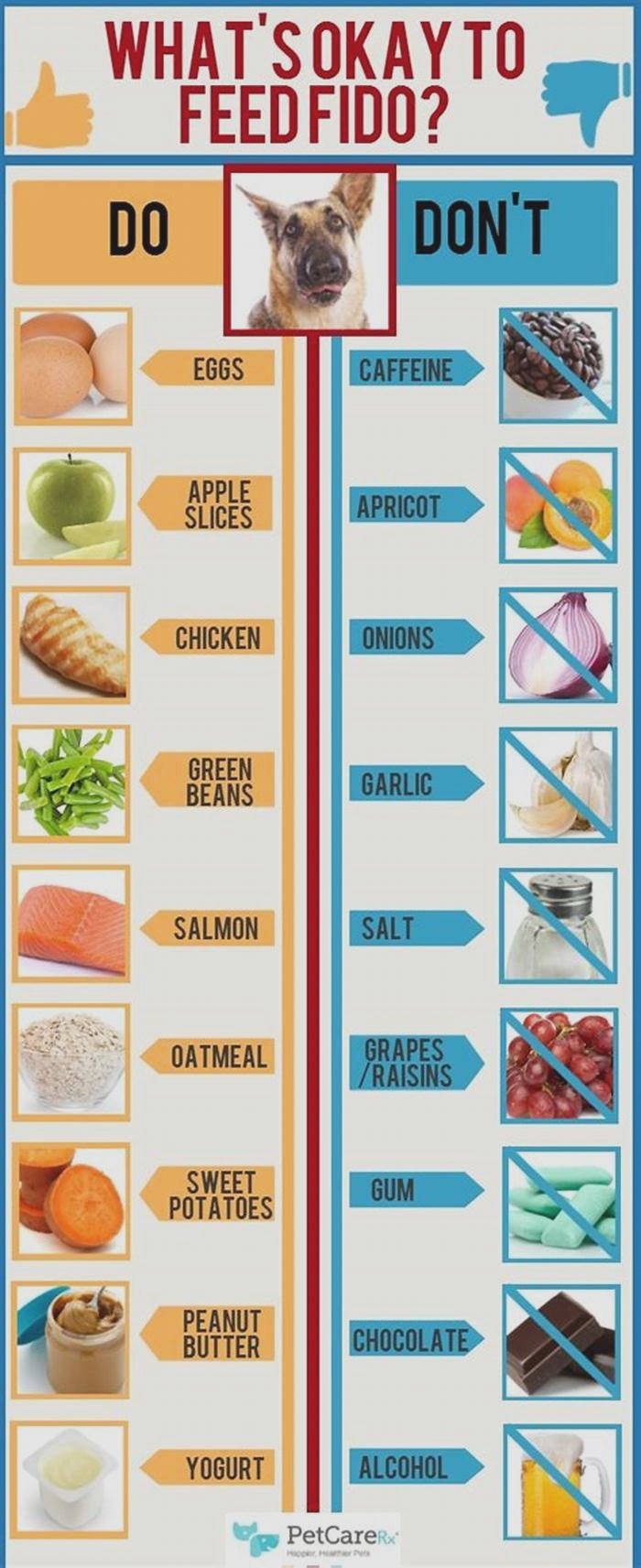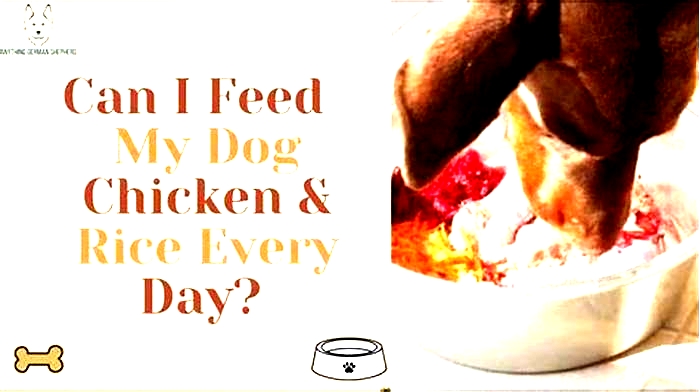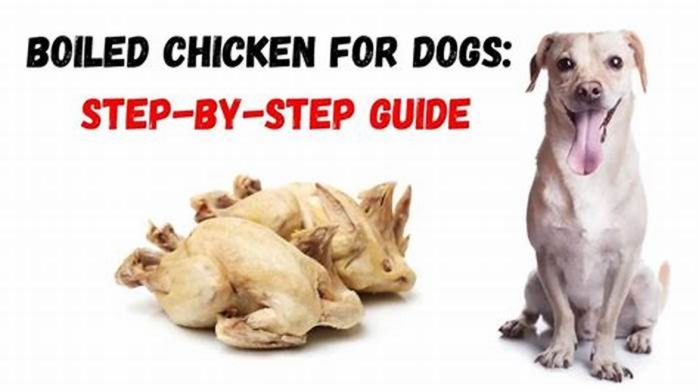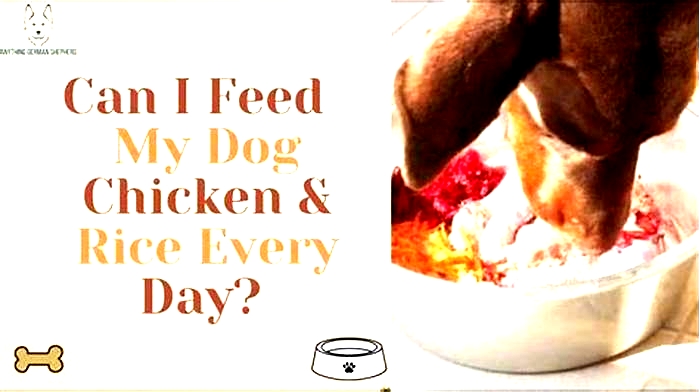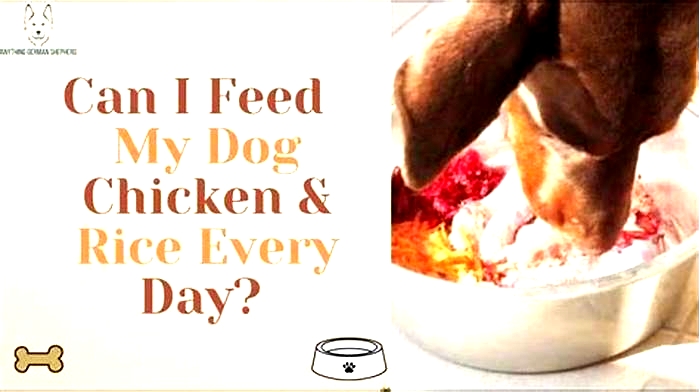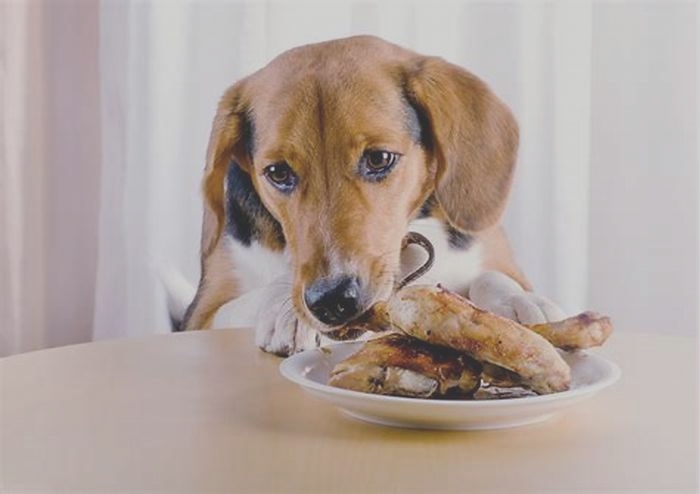Can I feed my dog rotisserie chicken every day
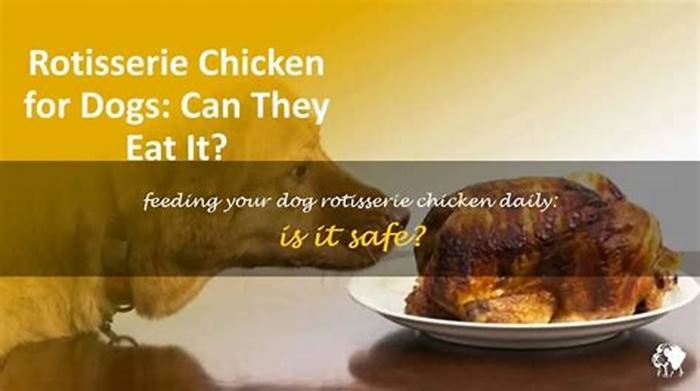
Can Dogs Eat Rotisserie Chicken? 7 Important Risks and Benefits

Dogs are renowned for their love of food, and its not uncommon for them to give you those irresistible puppy eyes when youre enjoying your delicious rotisserie chicken. But can dogs eat rotisserie chicken? The straightforward answer is yes but there are some important considerations to be aware of first.
In this article, well delve into this topic and provide you with all the information you need to make an informed decision about feeding rotisserie chicken to your pooch.
What Is a Rotisserie Chicken?
Before we explore the specifics of whether dogs can eat rotisserie chicken, lets first understand exactly what a rotisserie chicken is.
Rotisserie chicken is a popular culinary delight, enjoyed by humans all over the world. It is typically prepared by skewering a whole chicken onto a rotisserie spit, a rotating mechanism that slowly cooks the chicken over an open flame or in an oven. This cooking method helps the chicken become tender, juicy, and infused with flavorful seasonings. Rotisserie chickens are often found in grocery stores, delis, and restaurants, making them a convenient and accessible meal option for many people.
Rotisserie chickens are seasoned with various herbs and spices, which enhance their taste and aroma. The seasoning may include ingredients like salt, pepper, garlic, rosemary, thyme, and paprika, among others. The result is a succulent and savory chicken that appeals to both the eyes and the palate.
Can Dogs Eat Rotisserie Chicken?
Now that we have a clear understanding of what a rotisserie chicken is, lets address the burning question: Can dogs eat rotisserie chicken? The answer is yes, dogs can eat rotisserie chicken, but there are several important caveats and guidelines to consider:
- Plain and Unseasoned: Dogs should only consume plain and unseasoned rotisserie chicken. The seasonings used in many rotisserie chicken recipes can be harmful to dogs. Ingredients like garlic and onion, which are often found in seasoning blends, are toxic to dogs and can lead to serious health issues, such as hemolytic anemia.
- Remove the Skin: The skin of rotisserie chicken is usually high in fat and can be difficult for dogs to digest. Its best to remove the skin before feeding any chicken to your dog.
- Bones: Avoid giving your dog any bones from rotisserie chicken. Cooked bones, including those from rotisserie chicken, can splinter and pose a choking hazard or cause internal injuries to your dog. Always remove bones before offering chicken to your pet.
- Moderation: As with any human food, moderation is key. Rotisserie chicken should only be an occasional treat for your dog, not a regular part of their diet. Excessive consumption of chicken can lead to digestive upset and nutritional imbalances.
- Allergies and Sensitivities: Some dogs may have allergies or sensitivities to chicken or poultry products. If youre introducing rotisserie chicken to your dogs diet for the first time, monitor them closely for any adverse reactions, such as vomiting, diarrhea, or skin issues.
- Consult Your Vet: Its always a good idea to consult your veterinarian before making any significant changes to your dogs diet, including introducing new foods like rotisserie chicken. Your vet can provide guidance based on your dogs specific health needs.
- Avoid Leftovers: Do not feed your dog leftover rotisserie chicken that has been sitting out at room temperature for an extended period. Bacteria can multiply rapidly on cooked chicken, potentially leading to food poisoning in both humans and dogs.
- Portion Control: Be mindful of portion sizes. For smaller dog breeds, a small amount of chicken goes a long way, so ensure you dont overfeed.
- Maintain a Balanced Diet: While rotisserie chicken can be a tasty addition to your dogs diet, it should not replace their regular dog food. Dogs need a balanced diet that includes proteins, carbohydrates, fats, vitamins, and minerals, and commercial dog food is formulated to meet these nutritional requirements.
- Health Considerations: If your dog has specific health conditions, such as pancreatitis or food allergies, you must be even more cautious about introducing new foods into their diet. Again, consult with your vet for personalized advice.
What are the Benefits of Feeding Rotisserie Chicken to Dogs?
Rotisserie chicken, when offered in moderation and prepared correctly, can offer some potential benefits to dogs:
1. High-Quality Protein
Rotisserie chicken serves as an excellent source of high-quality protein for dogs. Protein is vital for the growth and repair of muscles and tissues. It supports the development of lean muscle mass, ensuring that your dog stays strong and active. Furthermore, the amino acids found in protein are essential for various bodily functions, including enzyme production, immune system support, and maintaining healthy skin and coat.
2. Palatability
One of the standout qualities of rotisserie chicken is its palatability. Dogs often find the taste and aroma of chicken irresistible. This characteristic makes it an excellent option for enticing picky eaters to consume their regular dog food. Adding a small amount of plain, boneless rotisserie chicken as a topper can make their meals more appealing, ensuring they receive the necessary nutrients even if they have finicky eating habits.
3. Nutrient Variety
Rotisserie chicken is not just about protein; it also contains various essential nutrients that can benefit your dogs overall health. For instance, its a good source of vitamins B6 and B12, which play essential roles in energy metabolism and the formation of red blood cells. Additionally, niacin, also known as vitamin B3, supports proper cell function, while minerals like selenium and phosphorus contribute to bone health and overall vitality. When given in moderation, rotisserie chicken can help diversify your dogs nutrient intake.
4. Easy to Digest
When the skin and bones are removed, rotisserie chicken becomes relatively easy for dogs to digest. It is a lean source of protein that can be gentle on the digestive system, making it a suitable option for dogs with sensitive stomachs or those prone to digestive issues. Offering plain, boneless chicken can help alleviate any gastrointestinal discomfort while providing essential nutrition.
5. Bonding and Training
Beyond its nutritional value, rotisserie chicken can play a significant role in strengthening the bond between you and your dog. Using small, bite-sized pieces as treats during training sessions is an effective way to motivate your dog and reinforce positive behavior. The reward of tasty chicken can enhance the training experience, making it more enjoyable for both you and your canine companion. This bonding experience can foster a closer relationship and improve communication between you and your dog.
What are the Risks of Feeding Rotisserie Chicken to Dogs?
While there are potential benefits to feeding rotisserie chicken to dogs, its crucial to be aware of the associated risks:
1. Onion & Garlic
Rotisserie chicken often contains seasonings and spices that can be problematic for dogs. These seasonings may include ingredients like garlic and onion, which are toxic to dogs and can lead to severe health issues. To ensure your dogs safety, always opt for plain, unseasoned rotisserie chicken.
2. High Fat Content
The skin of rotisserie chicken is typically high in fat, which can pose digestive challenges for dogs. Excessive fat consumption can lead to digestive upset and, in severe cases, pancreatitis, a painful and potentially life-threatening condition. To mitigate this risk, it is essential to remove the skin from rotisserie chicken before offering it to your dog.
3. Bones
Cooked chicken bones, including those from rotisserie chicken, can splinter easily and pose serious dangers to dogs. These bones can become choking hazards or cause internal injuries, such as punctures or blockages in the digestive tract. Always exercise caution and ensure that all bones are thoroughly removed before serving chicken to your dog.
4. Allergies and Sensitivities
Just like humans, dogs can have allergies or sensitivities to specific foods, including chicken or poultry products. When introducing rotisserie chicken to your dogs diet for the first time, closely monitor them for any adverse reactions, which may include vomiting, diarrhea, or skin issues. If such reactions occur, its advisable to discontinue feeding chicken and consult your veterinarian.
5. Imbalanced Diet
Feeding excessive amounts of rotisserie chicken without considering the overall nutritional balance of your dogs diet can result in imbalances and deficiencies. While chicken can be a valuable addition, it should not replace your dogs regular commercial dog food, which is specially formulated to meet their specific nutritional needs.
6. Risk of Contamination
Leftover rotisserie chicken that has been sitting out at room temperature can become a breeding ground for harmful bacteria. Consuming such contaminated chicken can lead to food poisoning, affecting both humans and dogs. To minimize this risk, avoid feeding your dog leftover chicken that has been left out for an extended period.
7. Weight Management
Excessive consumption of rotisserie chicken can lead to weight gain in dogs, which can be detrimental to their overall health. Maintaining portion control and ensuring that chicken is given as an occasional treat is crucial to avoid unwanted weight gain and related health issues.
Onion and Garlic Toxicity in Dogs
Onion and garlic toxicity is a significant concern for dogs and should be taken very seriously. Both onions and garlic belong to the Allium family of plants, and they contain compounds that can be highly toxic to dogs when ingested in sufficient quantities.
These compounds, primarily thiosulfate, can cause oxidative damage to a dogs red blood cells, leading to a condition known as hemolytic anemia. Hemolytic anemia results in the destruction of red blood cells, which are responsible for transporting oxygen throughout the body.
Symptoms of Toxicity in Dogs:
When these cells are damaged, it can lead to the following range of symptoms:
- Weakness
- Lethargy
- Pale gums
- Rapid breathing
- Jaundice (yellowing of the skin and eyes).
If you suspect that your dog has ingested onions or garlic, or if you observe any of the symptoms associated with toxicity, its essential to seek immediate veterinary care. The veterinarian may induce vomiting, administer activated charcoal to absorb toxins, and provide supportive care such as oxygen therapy and blood transfusions, depending on the severity of the poisoning.
Can Dogs Eat Rotisserie Chicken Skin?
Its generally best to avoid giving your dog the skin of rotisserie chicken. While dogs can technically eat it, there are some important reasons to consider removing it. First, chicken skin is high in fat, which can be hard for dogs to digest and may lead to digestive issues or weight gain. Secondly, the skin often contains the concentrated seasonings and spices used in cooking, some of which can be toxic to dogs, such as garlic and onion.
Lastly, the extra calories from chicken skin can contribute to obesity if consumed regularly, which can lead to various health problems for your dog. To ensure your dogs safety and health, its best to remove the skin from rotisserie chicken before sharing it with them.
How Much Rotisserie Chicken can I Give to my Dog?
The amount of rotisserie chicken you can safely give your dog depends on several factors, including their size, age, and dietary needs. As a general guideline, small to medium-sized dogs can typically have a small, bite-sized piece of plain, unseasoned, and boneless rotisserie chicken as an occasional treat.
Larger dogs may be able to have slightly larger portions, but its crucial to practice moderation. Rotisserie chicken should make up only a small fraction of your dogs overall diet, and treats, including chicken, should account for no more than 10% of their daily calorie intake.
Always remove the skin and bones from the chicken, and be watchful for any adverse reactions, especially if its your dogs first time trying it. To ensure your dogs health and well-being, consult with your veterinarian for specific recommendations tailored to your dogs individual needs.
Nutritional Information:
Here are the approximate nutritional values for a typical serving of rotisserie chicken (3.5 ounces or 100 grams) without the skin:
- Calories: 165-190 calories
- Protein: 31 grams
- Fat: 3-5 grams
- Carbohydrates: Negligible
- Vitamins: Niacin (B3), Vitamin B6, Vitamin A (small amounts)
- Minerals: Phosphorus, Selenium
- Sodium: Moderate (varies based on seasoning)
- Fiber: Minimal
Should I Feed my Dog Rotisserie Chicken Instead of Dog Food?
Its important to use caution and moderation when incorporating rotisserie chicken into your dogs diet. Feeding too much chicken without considering the overall nutritional balance can lead to imbalances and deficiencies.
Rotisserie chicken should not replace commercial dog food, which is formulated to meet your dogs specific nutritional needs. Furthermore, not all commercial dog foods are of equal quality, so choosing a reputable brand is crucial.
Conclusion
In conclusion, the question Can dogs eat rotisserie chicken? can be answered with a cautious yes. Dogs can enjoy plain, unseasoned, and boneless rotisserie chicken as an occasional treat, provided that its offered in moderation and prepared safely. Always remove the skin, bones, and seasonings, and consult with your veterinarian if you have any concerns or specific dietary considerations for your dog.
Remember that rotisserie chicken should not replace your dogs regular commercial dog food, which is specially formulated to meet their nutritional needs. While rotisserie chicken can be a delicious and nutritious addition to your dogs diet, it should only be a small part of their overall meal plan. Balance, moderation, and proper preparation are key to ensuring your dogs safety and enjoyment when indulging in this popular human food.
So, the next time youre savoring a mouthwatering rotisserie chicken, feel free to share a small, plain piece with your canine companion, but always do so with their health in mind.

